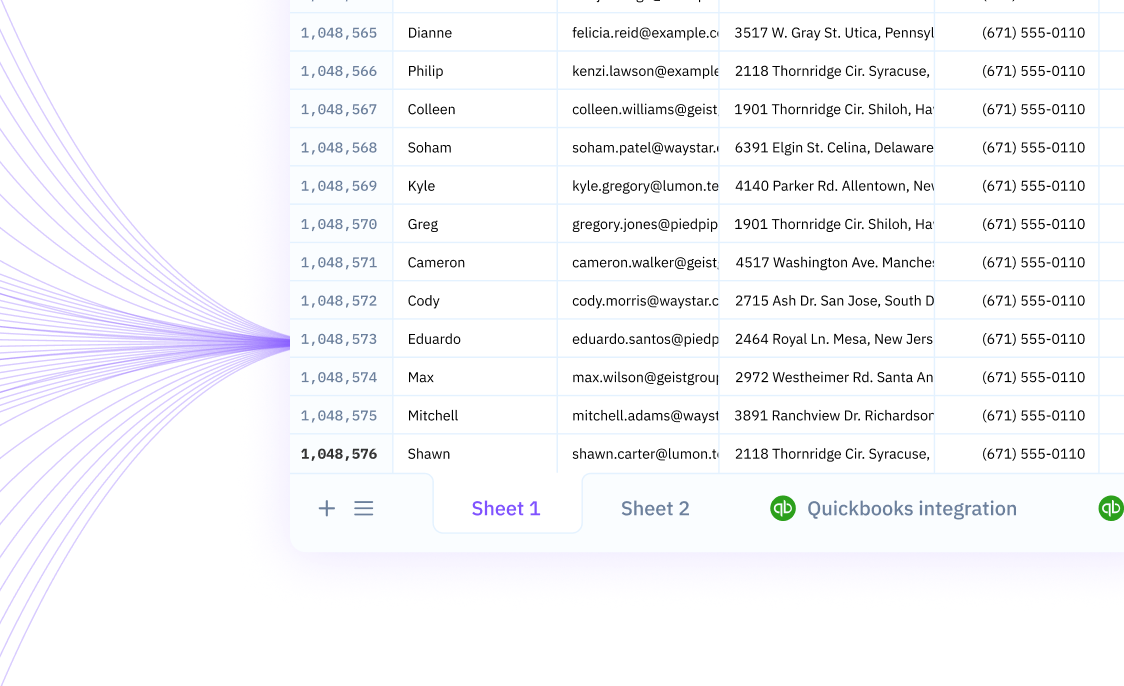
Export GitLab to CSV

Overview
Welcome to our comprehensive guide on exporting GitLab issues to a CSV file—a valuable process for enhancing your project management and data analysis capabilities. By converting your GitLab issues into a CSV format, you unlock the potential for thorough offline analysis, effortless sharing with teams outside of GitLab, and the creation of compelling diagrams, graphs, and charts within any spreadsheet program. On this page, we'll explore the essence of GitLab, provide a step-by-step tutorial on exporting issues to a CSV file, delve into practical use cases for this data format, examine an alternative to CSV exports for GitLab using Sourcetable, and address common questions about the CSV export process.
What is GitLab?
GitLab is a DevSecOps platform that is designed to provide all the essential tools required for software delivery. As an AI-powered platform, GitLab incorporates automation and AI-powered workflows, notably with GitLab Duo, to enhance the efficiency and speed of software development processes. It integrates security right from the start, ensuring that every stage of development is secure.
With its capability to deploy anywhere, GitLab supports a wide range of applications and services. As a testament to its leadership and effectiveness in the DevSecOps space, GitLab has been recognized as the only Leader in The Forrester Wave: Integrated Software Delivery Platforms, Q2 2023, and stands as a Leader in the 2023 Gartner Magic Quadrant for DevOps Platforms. Moreover, it ranks as a G2 Leader across DevSecOps categories.
How to Export GitLab to a CSV File
Streaming
Streaming CSV export queries and yields data in batches directly to a response stream, immediately starting the download and making the report available to the user. This method requires a reliable connection to ensure the complete transfer of data without interruption.
Downloading
Downloading CSV export involves querying and writing data in batches to a temporary file, then loading this file into memory, and sending it to the client. Although the report is available immediately, downloading large datasets may lead to request timeouts due to its memory-intensive nature. Users need a different application, such as email, to download the CSV, and attachment sizes may be limited.
Emailing
The CSV file generated by GitLab can be attached to an email and sent to the user's default notification email address. This allows users to easily share the exported data with teams who may not have access to GitLab and to use it with various spreadsheet-based programs or for offline analysis.
Polling
Polling CSV export works by processing the query asynchronously with a background job. The frontend polls periodically to check for completion, and once done, the CSV file is automatically downloaded to the user's local machine. However, users are required to stay on the page until the export is completed.
Persistent State Polling (Vulnerabilities Export)
Persistent state polling is used for vulnerabilities export, where the system handles the export process in the background, allowing the user to navigate away from the page without interrupting the export process.
Streamline Your GitLab Data Management with Sourcetable
Instead of the traditional approach of exporting your GitLab data to a CSV file and then importing it into a separate spreadsheet program, consider the dynamic capabilities of Sourcetable. This powerful tool is designed to sync your live data directly from a variety of apps or databases, including GitLab, into its intuitive spreadsheet interface. The seamless integration spares you from manual export-import cycles, saving time and reducing the risk of data handling errors.
Sourcetable elevates your data management experience by enabling real-time data pulling from multiple sources. This means your GitLab information is always up to date, providing you with the most current insights for your analysis. Furthermore, Sourcetable's familiar spreadsheet functionality coupled with its robust automation features streamlines your workflow, making it a superior choice for business intelligence tasks. Embrace the efficiency and accuracy of Sourcetable to enhance your data-driven decision-making process.
Common Use Cases
-
Exporting a small dataset for immediate analysis
-
Exporting a large dataset without impacting the application memory
-
Sending a dataset directly via email to stakeholders
-
Providing a downloadable link for a dataset that can be accessed at a later time
-
Performing an export operation without the need to keep the browser open
Frequently Asked Questions
How do I export issues to a CSV in GitLab?
GitLab allows exporting issues to a CSV through multiple methods including streaming, downloading, emailing, or polling. Choose the appropriate method based on your needs such as immediate access, local sharing, or handling large datasets.
What can I do with a CSV list of issues from GitLab?
A CSV list of issues from GitLab can be used for data analysis, sharing with team members, importing into other applications, or generating reports.
What are some common issues when working with exported issues from GitLab?
Common issues include the need for a reliable connection when streaming, managing user permissions and vulnerabilities when downloading, and potentially long wait times for exporting large CSVs when polling.
Conclusion
In summary, GitLab provides a robust and flexible set of options for exporting issues to CSV, catering to different user needs and technical constraints. Whether you prefer streaming for immediate access, downloading for a direct approach, emailing for convenience, or polling, with either non-persistent or persistent states for continued tracking, GitLab supports it all. Each method ensures that the data can be used to create snapshots for offline analysis, diagrams, charts, and conversion to other formats, while requiring only the Reporter role to initiate the export. The CSV file, which can be opened in various spreadsheet-based programs like Microsoft Excel, OpenOffice Calc, and Google Sheets, is designed in plain-text format without containing attachments. For those looking for an even more streamlined process, consider bypassing the traditional export methods by using Sourcetable to import your GitLab data directly into a spreadsheet. Sign up for Sourcetable today to simplify your workflow and enhance your data management capabilities.



